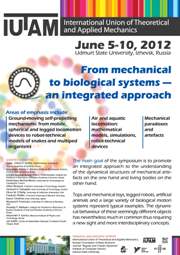The main research avenues of the theoretical section are as follows:
1. Mathematical treatment of dynamical chaos.
The discovery of dynamical chaos is considered, by right, as one of the most remarkable recent scientific achievements. Due to this fact, many complicated problems of natural science and engineering gained an adequate mathematical description. However, until now, there are still a number of open problems in the mathematical theory of dynamical chaos such as the theory of Lorenz attractors with several equilibria, the theory of pseudo-hyperbolic strange attractors (that generalizes the theory of Lorenz attractors and seems to be able to provide examples of new multidimensional genuine strange attractors) etc. As for chaotic phenomena in nearly Hamiltonian systems, it is necessary to understand how Hamiltonian chaos transforms into dissipative chaos and what dynamical phenomena accompany this transitions.
2. Evaluation of the theory of global bifurcations of multi-dimensional Hamiltonian systems.
Analysis of the behavior of the orbits of Hamiltonian and reversible systems in the vicinity of homoclinic trajectories and heteroclinic contours.
We also plan to elaborate general topological methods for analysis of bifurcations and stability of periodic solutions in complicated non-integrable dynamical systems.
3. Control of dynamical systems under uncertainty.
There is planned the development of novel methods for the synthesis of optimal feedback control laws for complicated dynamical systems with certain restrictions imposed on the control and phase variables; the methods are then to be applied to elaboration of control strategies of mechanical systems.
4. Development of software for simulation of dynamical systems of interest.
The recent advances in the theoretical mechanics and mechatronics are inseparable from computer simulations. On the one hand, simulations are useful for elaboration of new methods for analysis of dynamical systems and discovery of novel dynamical effects. On the other hand, a relevant computer software is invaluable for a preliminary design of structural elements.
Within the framework of the project the development of a “Computer dynamics” software complex is planned. The complex uses highly productive parallel architecture and is a powerful tool for a detailed analysis of almost arbitrary dynamical system. The main purpose of the “Computer dynamics” software complex is the study of complicated dynamical systems that arise in the non-holonomic mechanics, vortex hydrodynamics, Celestial mechanics etc. Besides its major purpose (research), the complex will be used as a base on which educational software for undergraduate and graduate students will be developed.






